MY DOG ……. A SURPRISE FOR ME
OR
HOW I FINALLY GOT HIM!
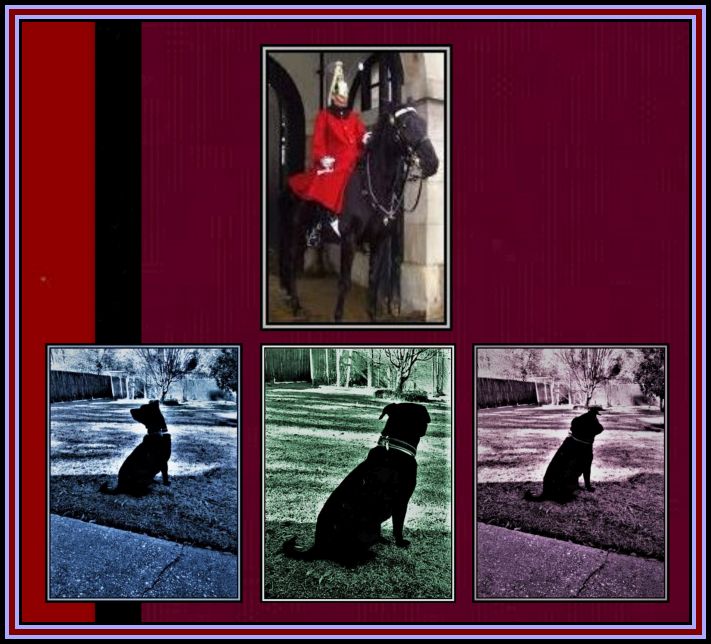
-oOo-
PAGE EIGHT:
CASANOVA/PUPPY …….
A ROSE BY ANY OTHER NAME

-oOo-
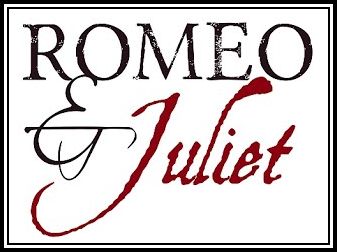
According to the words of William Shakespeare (1564-1616) brought to our attention in his play, Romeo and Juliet, What’s in a name? That which we call a rose by any other name would smell as sweet.
 William Shakespeare
William Shakespeare
Romeo and Juliet was written between 1591 and 1595, was first published in a Quarto version in 1597.
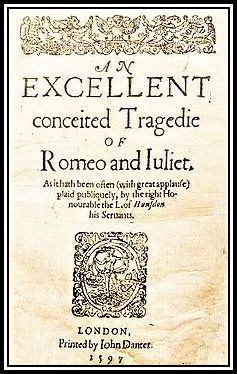
It does not seem to be clear when the first staging took place, but it appears that it most likely was produced during 1597 at The Theatre in Shoreditch (constructed in 1576 by James Burbage (~1531-1597), which was an Elizabethan Playhouse found on Curtain Road. Yet some records show that it was first presented at The Globe Theatre, which was built by James Burbage’s son, Richard (1567-1619), on the South Bank (Bankside) of the River Thames in London in 1595.
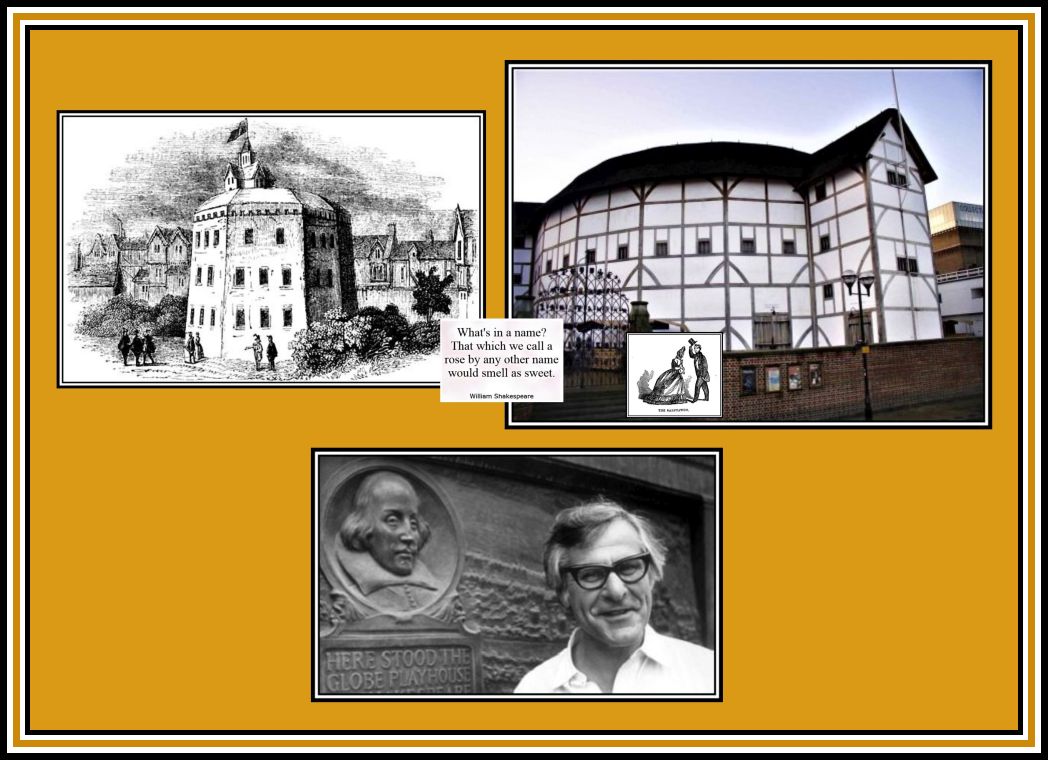 The Original Globe Theatre (Top Left) ~1600 and Shakespeare’s Globe (Top Right) founded by the actor and director, Sam Wanamaker (1919-1993) (Bottom), and opened in 1997
The Original Globe Theatre (Top Left) ~1600 and Shakespeare’s Globe (Top Right) founded by the actor and director, Sam Wanamaker (1919-1993) (Bottom), and opened in 1997
The Globe Theatre occupied by Shakespeare’s playing company, the Lord Chamberlain’s Men, was built on land owned by Thomas Brend and inherited by his son, Nicholas Brend and grandson Sir Matthew Brend. The Theatre was destroyed by fire on 29 June, 1613 seeming as a result of a problem with a canal when the play, Henry VIII, was being presented. A second Globe Theatre was built on the same site by June 1614, but was closed by an Ordinance issued on 6 September, 1642.
-oOo-
The plot of Romeo and Juliet is based on an Italian tale translated into verse as The Tragical History of Romeus and Juliet by Arthur Brooke in 1562 and retold in prose in Palace of Pleasure by William Painter in 1567. The first actors to perform the roles of the two young star-crossed lovers whose deaths ultimately reconcile their feuding families were Richard Burbage as Romeo and Master Robert Goffe/Gough/or Goughe (~1580-1624), a boy, as Juliet. Young men and boys took women’s roles at this time since women were not permitted to perform on the stage.
-oOo-
My own relationship with Romeo and Juliet first began when I was about eleven years old. I had to suffer taking my turn to read a passage aloud from the play during English Classes. I am sure that the reader must appreciate how boringly we read Shakespeare’s words, not knowing what most of the text actually meant, and actually not caring either! During that time, I remember hearing a short poem about the couple, which like my cohorts, I found most amusing:
‘Twas in a restaurant they met Romeo and Juliet.
‘Twas there that Romeo fell into debt.
For Rome-owed what Juli-et!
At this time, I must confess that I found this rhyme more to my taste than that of either the Balcony (Act II, Scene II) or Death Scene (Act V, Scene III). However, once I was a little older, I quickly discovered the poetry of the play.
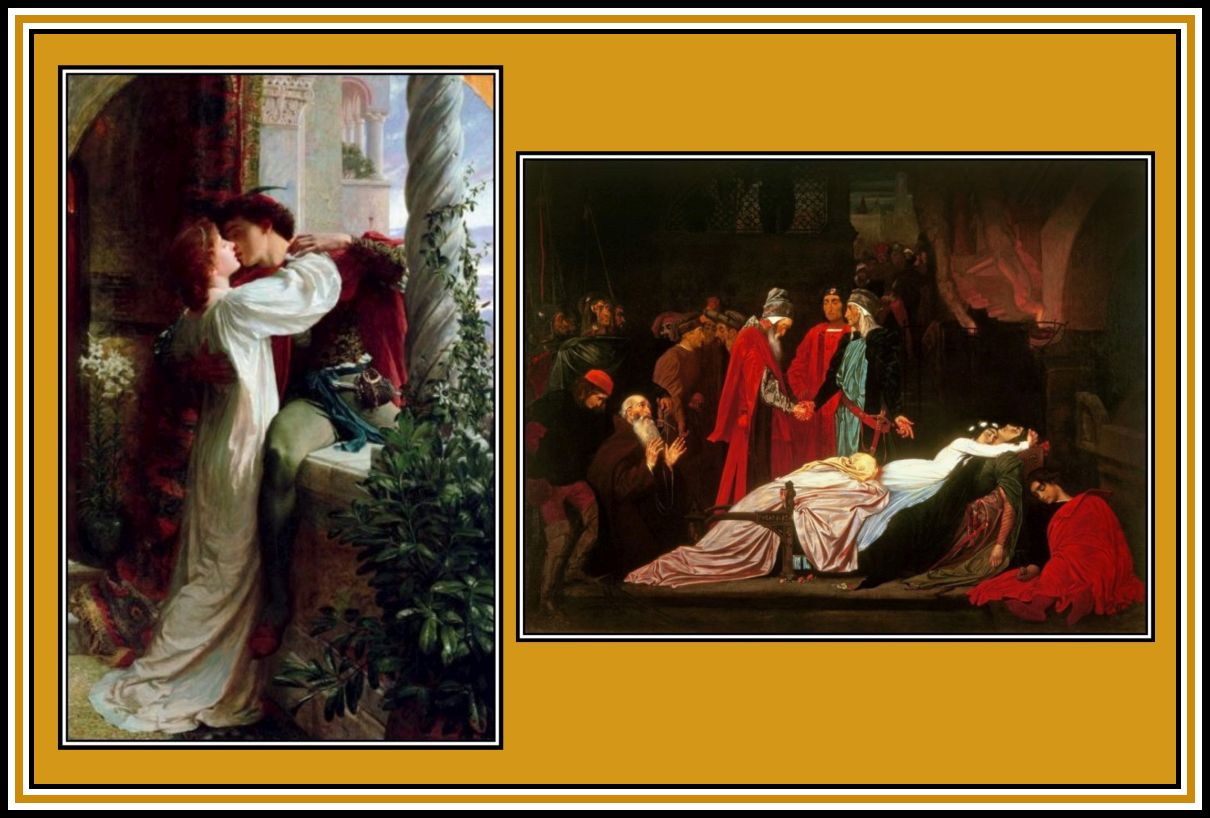 Left: The Balcony Scene painted by Sir Frank Dicksee (1853-1928);
Left: The Balcony Scene painted by Sir Frank Dicksee (1853-1928);
Right: The Death Scene painted by Sir Frederic Leighton (1930-1896)
-oOo-
I was never one to join in School Activities willingly, but when I was about sixteen years of age, I went on a School Trip to the Old Vic Theatre in London. We went to see a new production of the Romeo and Juliet directed by Franco Zeffirelli (1923-2019 with John Stride (1936-2018) and Judi Dench (1934). I went mainly because a couple of my friends who were thinking of going to Drama School were raving about the reviews of the play that they had read in the newspapers.
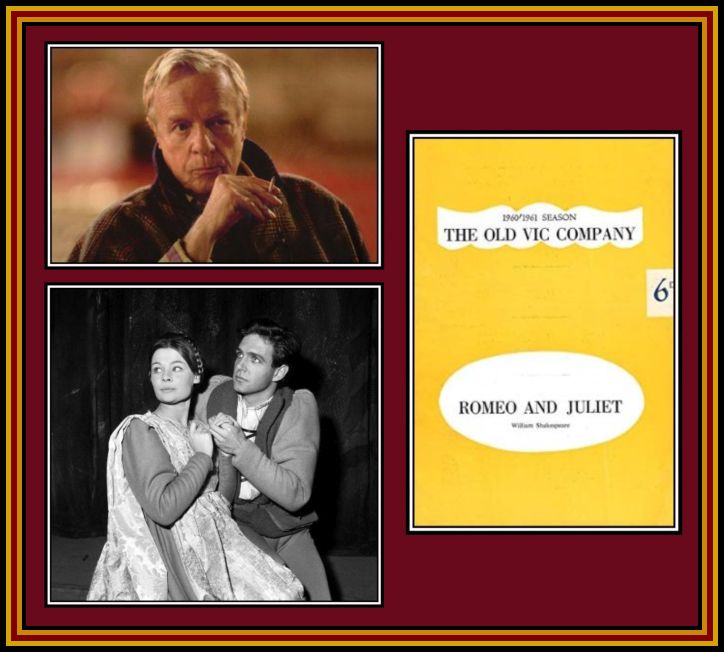 Old Vic Production (1960-1961 Season) of Romeo & Juliet
Old Vic Production (1960-1961 Season) of Romeo & Juliet
Top Left: Franco Zeffirelli; Bottom Left: Judi Dench & John Stride;
Right: Programme
I have to admit that I was very impressed by the play and heard it and saw it anew. On stage, the play suddenly came to life, thanks not only to the acting, but also to the decor which I found to be spectacular mainly for the remarkably well chosen colours, especially the deep rich red and black. Although I have seen the play a number of times since, I have to confess that this remains my favourite stage production.
-oOo-
A few years later (1968), Zeffirelli used this stage production as the basis for a remarkable film version of the play, but this time, he cast relatively unknown actors as Romeo and Juliet who were roughly the same age as the characters in the play. The result was a stunning film with remarkable performances by Olivia Hussey (1951) and Leonard Whiting (1950), and which to my mind, is still the very best interpretation of the play.
 Franco Ziffirelli’s filmed adaptation, 1968
Franco Ziffirelli’s filmed adaptation, 1968
Left: Olivia Hussey & Leonard Whiting;
Right: Poster
-oOo-
Over the years, Romeo and Juliet has been produced in just about every country in the world and has been translated into a multitude of languages. Since seeing the Zeffirelli production at the Old Vic, I have seen productions in French, Dutch, Russian and Swedish, as well as a number in English.
The play has also been adapted into at least seven operas of which the most famous is that by Charles Gounod with a French libretto by Jules Barbier (1825-1901) and Michel Carré (1821-1872). It was first performed at the Théâtre-Lyrique Impérial du Châtelet in Paris on 27 April 1867. The play has also been adapted into several ballets, the most famous of which were conceived by Sergey Prokofiev (1891-1953) and Pyotr Ilyich Tchaikovsky (1840-1893).
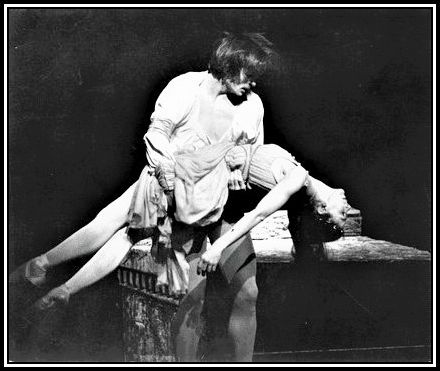 Ruldolf Nureyev (1938-1993) as Romeo and Margot Fonteyn (1919-1991) as Juliet
Ruldolf Nureyev (1938-1993) as Romeo and Margot Fonteyn (1919-1991) as Juliet
In addition, the play has been produced in settings other than the City of Verona and also at various times. Of these productions, I have to confess that I find the production of the musical play, West Side Story (1957) , where the setting was relocated to New York City during the late 1950s, to be the most exciting and spectacular.
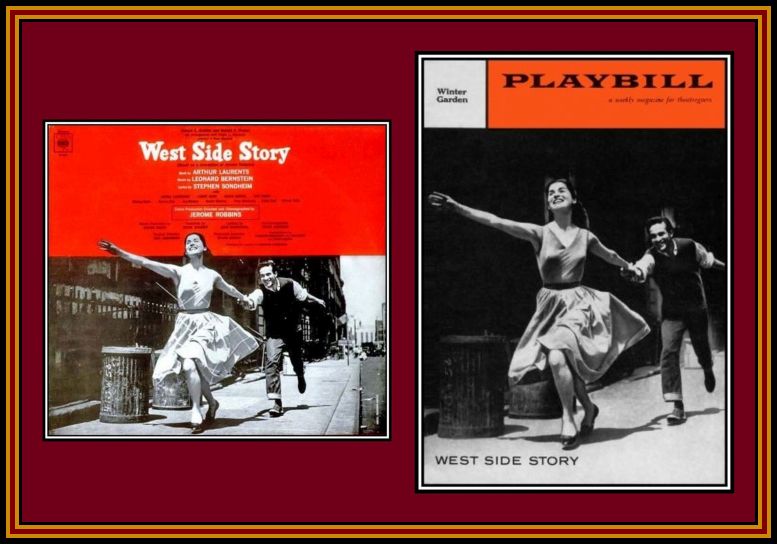 West Side Story
West Side Story
Left: Album Cover of the Original Broadway Production
with Carol Lawrence (1932) as Maria and Larry Kert (1930-1991) as Tony
Right: Programme of the Original Production
-oOo-
Casanova/Puppy had been named by his previous owner’s son. Seeing that she had been born in Italy, her son thought it appropriate to give the puppy an Italian name. However, his mother was not of a mind to actually call the dog when he was a puppy by his given name, except when taking him to the Vet (Veterinary Surgeon). Instead she chose to call him Puppy, which she continued to do so once he was fully grown.
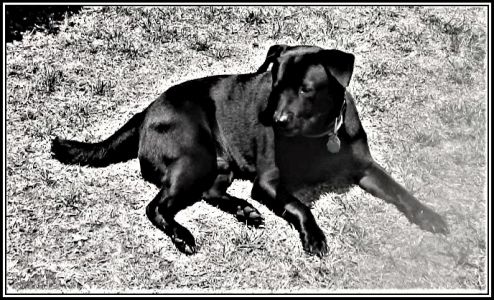
My neighbour would also use several names of endearment when referring to the dog. Among her favourites were Ciccio and Ciccino. She would call him this when they were sitting quieting and she was stroking his neck and face. Apparently, Ciccio is a nickname for any Italian or Calabrian male named Francesco. In Calabrese dialect, the name is translated as Frankie. It can also mean chubby or fat, but without any derogatory sense.
-oOo-
I have to admit that I hoped to change Casanova/Puppy’s name to something more in keeping with his personality. Please understand that I was not totally opposed to the name Casanova, but could not quite see myself calling out this name in public when I wanted him to come. Although I have to admit that, like his namesake, Giacomo Casanova (1725-1798), he seems to be especially fond of women and, to my eyes, flirts openly with those that he meets!
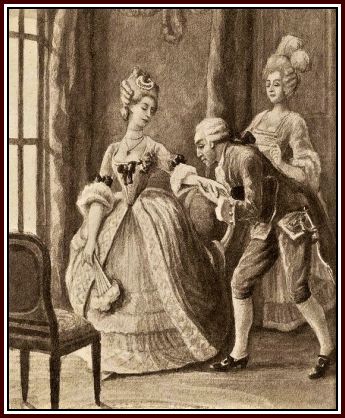
-oOo-
I was also none too happy to call him Puppy, seeing that he was about nine years of age at the time of his coming to live with me. No, I hoped to have him respond to a name that suited his personality.
So what name was I going to choose? First, I thought of something friendly and American: Buddy! But he only sniffed and walked away when I called him this! Next I tried all kinds of names in the hope that one might sound pleasing to his ear, but Puppy was the only name that he responded to!
During the first few weeks of his living with me, I naturally began to take note of certain of his habits. I have to admit that he had no obvious bad habits since he had been trained not to bark unless a stranger came to the door. He did not destroy cushions or letters and was perfectly house-trained. However, I did notice that he had a very inquisitive side to his nature: he liked to know what was going on around him. He enjoyed poking his nose into cupboards and the spaces between fence boards. He also enjoyed sitting in the midst of guests when they came to call and keeping an eye on the goings-on around him. In fact, I began to realise that he was nosey!
Casanova/Puppy soon began to develop favourites among the people that visited me. One particular favourite was the wife of a friend of mine. Her name is Victoria and although she is friendly and generally a nice person, she is, I hate to say it, extremely inquisitive ……. no, to be honest, she is nosy!

Victoria enjoys knowing everything whether the subject pertains to her or her family or not. This can often cause the wrath of her children and husband to descend on her. She always amuses me when she will enters a room and immediately begins to listen to a conversation in progress. Without really knowing what the subject of the conversation is, she will interrupt the flow and pose a number of questions, which she expects to be answered immediately. Unfortunately for her, over the years, her family have stopped answering such questions. However this does not stop her from pursuing her quest for answers and she next asks another host of questions. Eventually, she is scolded and told to mind her own business! Although I feel sorry for these rebuffs, once you have been on the end of one of her questioning onslaughts, you would quickly suggest to her to occupe-toi de tes oignons (mind your own business)!
Since Victoria and Casanova/Puppy seemed to share a proclivity of poking their noses where perhaps they do not belong until invited, I thought that Victor would an ideal name for him.
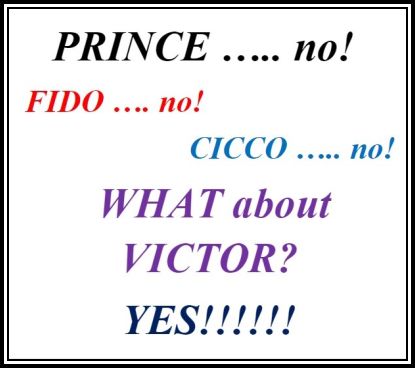
Naturally, Victoria was not amused when I told her of my decision to change the dog’s name and name him after her! Sadly for me, and happily for Victoria, Casanova/Puppy did not respond to this name either!
-oOo-
As a result, I fear that I am stuck with the name Puppy for my dog. Fortunately, despite my misgivings, he seems happy with it and comes whenever I call him. However, I am still somewhat embarrassed when strangers hear me calling him by this name and I am even more embarrassed when I hear myself trying to explain the name to them!!!

—oooOooo—

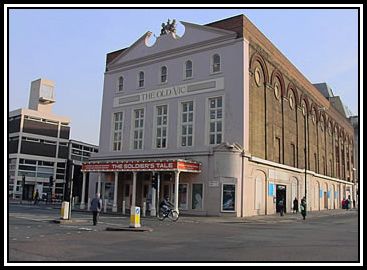 The Old Vic Theatre
The Old Vic Theatre